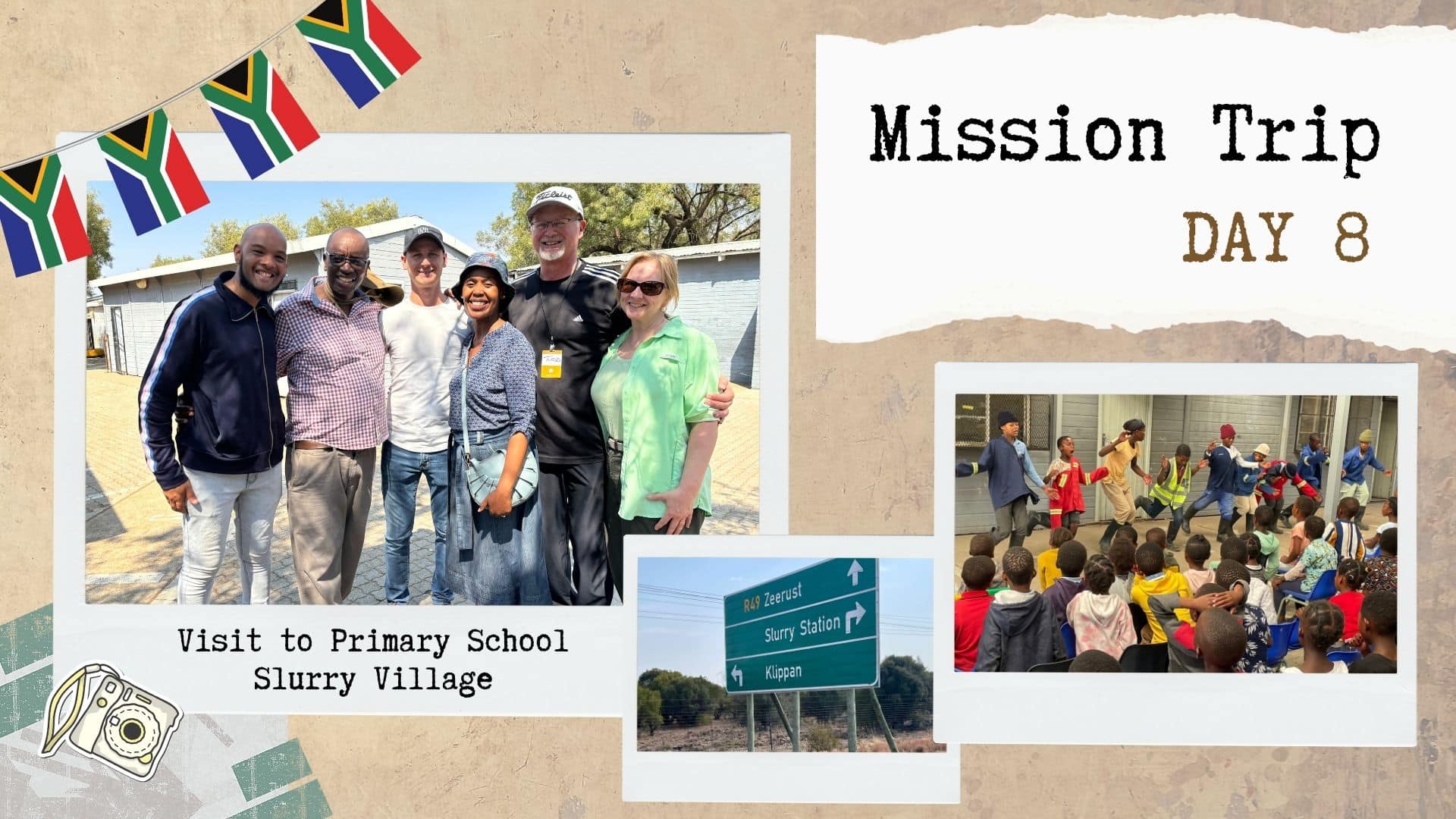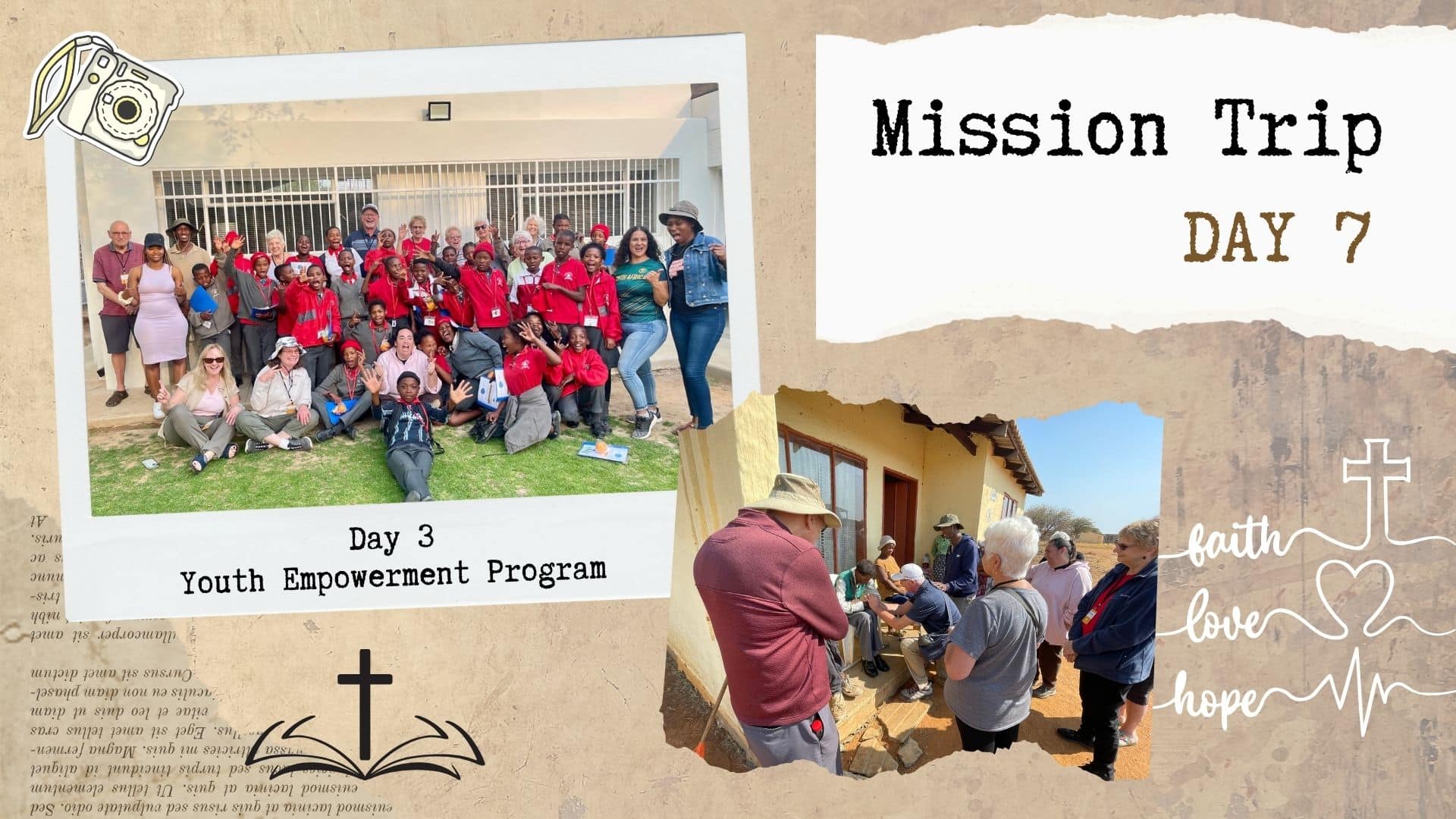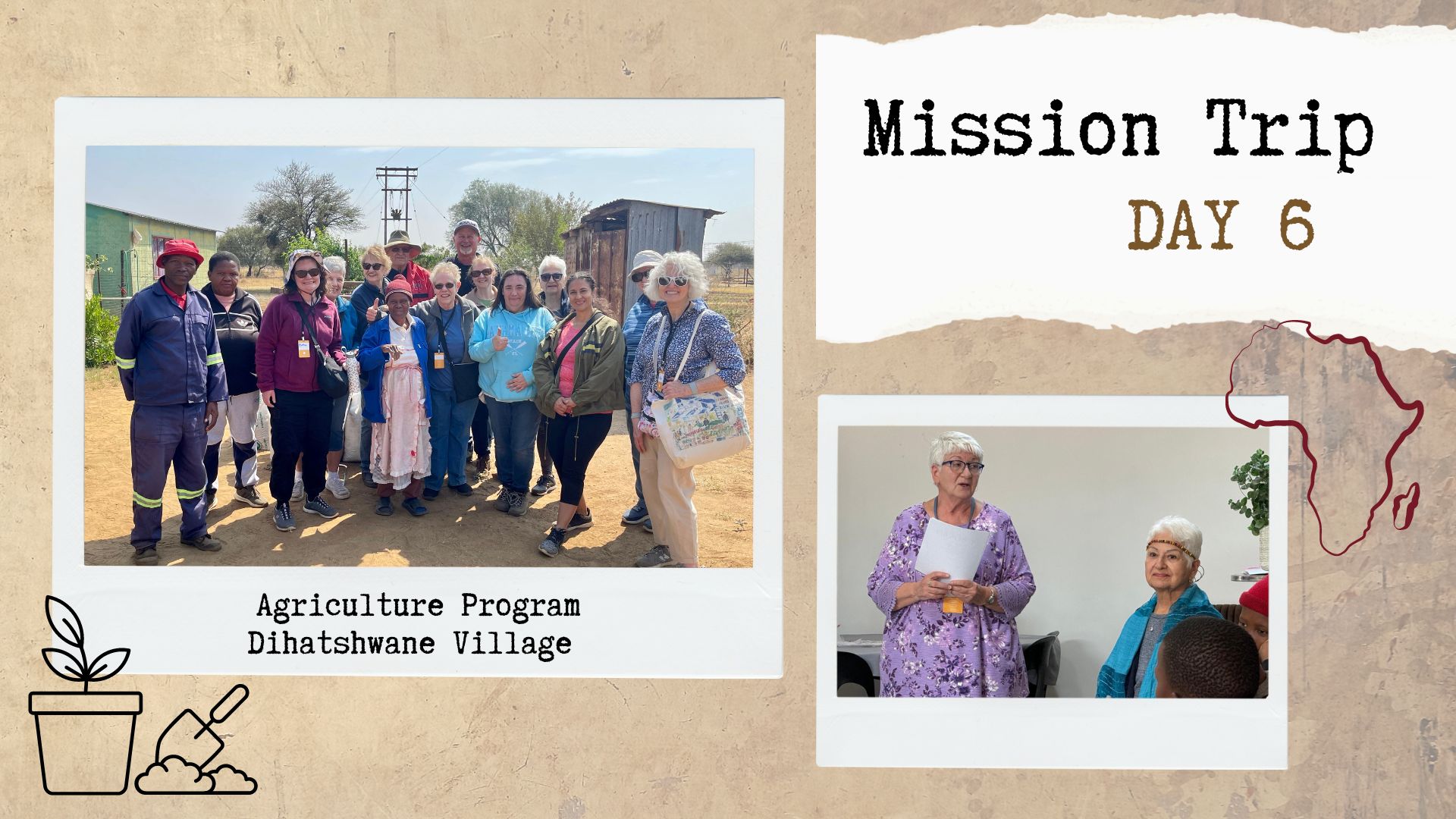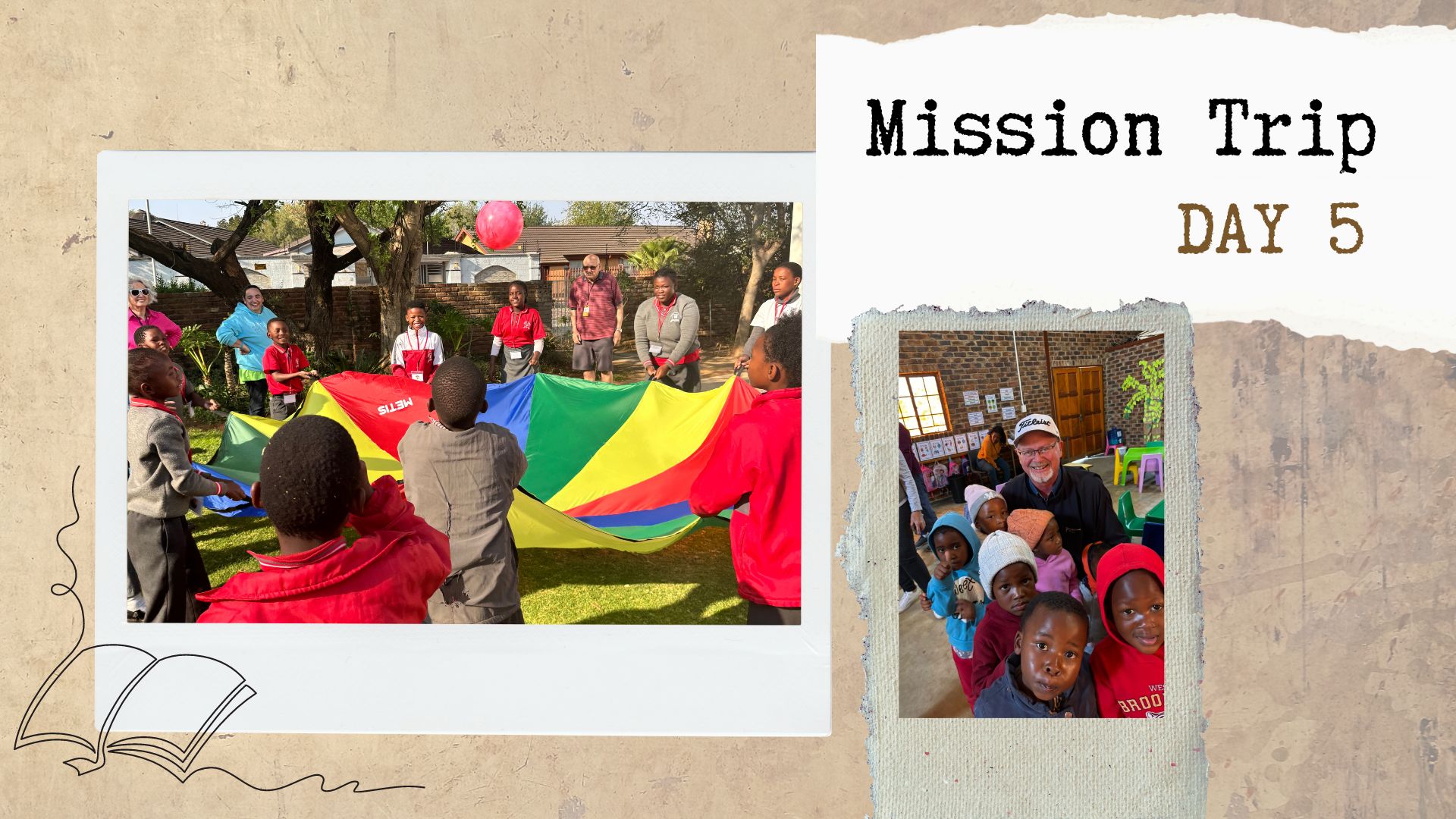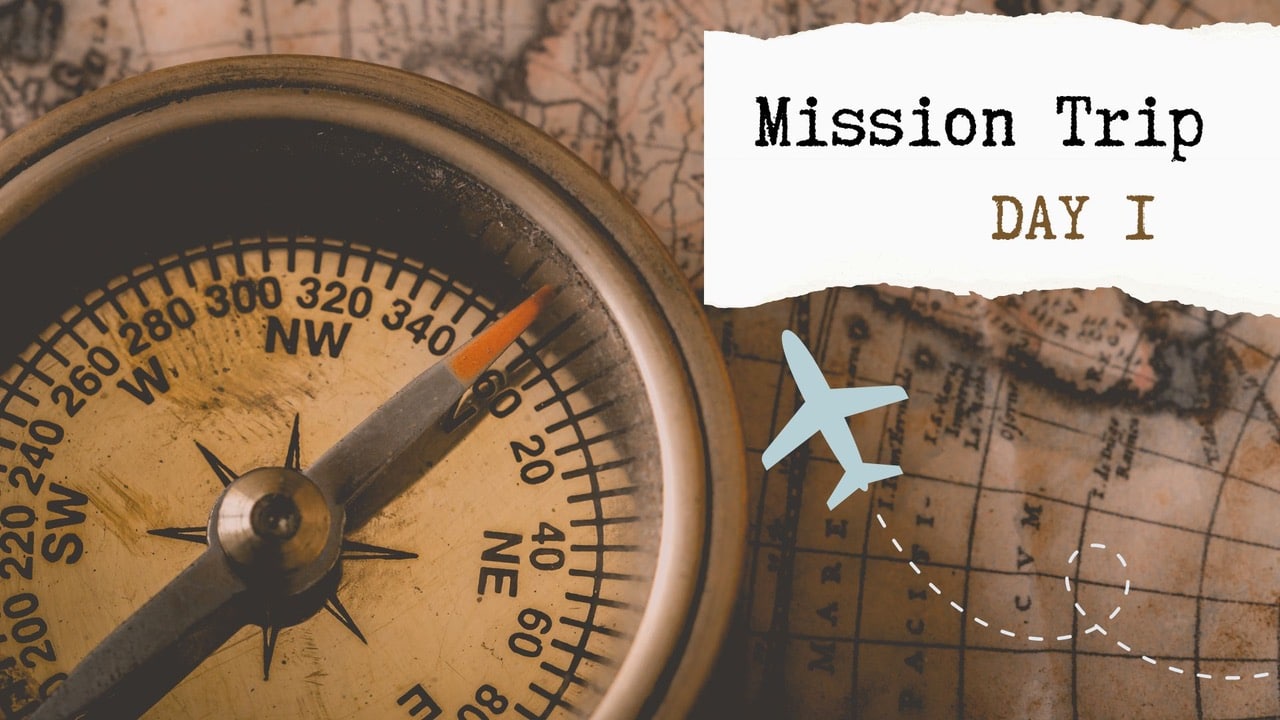“Rejoice always, pray continually, give thanks in all circumstances; for this is God’s will for you in Christ Jesus.” – 1 Thessalonians 5:16-18
8:00am Breakfast
9:00am – South African Orientation
12:00pm – Travel to Mission House
Lunch on the road @ Wimpy’s Burger Shop
Orientation Dinner @ Mission House in Mahekeng
During the orientation we learned some history about South Africa through discussion and videos put together by Mike & Michelle Tessendorf, founders of Orchard: Africa.
It was the religious heritage and the God fearing heritage of the French and the Dutch people that gave rise to a system which eventually became known as apartheid. It’s my opinion that European history in South Africa is very much a part of church history. During the 1600s, during the reformation, when people were being persecuted for their faith, many of the Dutch and the French people who were being persecuted found themselves being offered free passage to the Cape.
The tip of Africa was a perfect halfway mark for the ships that were trading in tea and silk and spices. They would come from the east and stop over in Cape Town, in this little colony that was started by these Dutch and French settlers and then go on their way to Europe. The European colonization of Africa coincided very much with the colonization of the United States.
The Afrikaan people group is one of the white language groups in South Africa. They are the descendants of the original French and Dutch settlers that arrived in the country in the 1600s. And what happened was a unique and indigenous ethnic and racial grouping was established in our country. These Dutch and French settlers were deeply religious people. As they read the scriptures about God giving the Israelites a promised land, they took these to heart and believed that South Africa was their new promised land.
If you fast forward a hundred years, these settlers had by now established farms, they had children who didn’t know Europe. This was their land. Africa was the land of their birth. The Cape Colony changed over from Dutch rule to British rule. And these farmers did not want to be ruled by the British. And so what they did is they took their women and their children, and they went north in search of new land to start new farms. The Great Track was a movement by the Afrikaan people out of the Cape Colony, out of the southern parts of the country, and into the northern and the eastern parts of the country, where they hoped to be able to find a place where they could have cultural and religious freedom away from the domination of the British rule in the Cape Colony.
However, as they began to move into the northern and the eastern parts of the country, they began to encounter the indigenous black tribes, people who had lived there for many years before. In one of the most well known conflicts in South African history, which became known as the Battle of Blood River, Andres Pretorius and 500 men fought off over 15,000 Zulu warriors and killed over 3,000 of them.
The Afrikaan settlers only sustained five injuries, and not one of them died. This battle helped to define a nation of Dutch settlers and farmers for years to come. If these Dutch settlers started being known as those who conquered with the Bible and with a gun, if this victory, really established in their heart that they were in covenant with God, and they truly believed that this victory was a sign from God that this was their promised land.
Every year on the 16th of December from that time onwards, it was commemorated as the Day of the Covenant, right up until the change of the new government in 1994. The Day of the Covenant became part of the religious history, part of the culture, part of who they were as a people. This whole process led to the concept of white supremacy and black inferiority. In fact, they believed that black people did not have souls. And so their religious heritage convinced them that black people, because they were soulless, were therefore unredeemable.
In the late 1890s, the gold and diamond rush brought the British and the Afrikaan people back into conflict. With these newly discovered resources, people from all over the world came to Johannesburg and intruded on the Afrikaans newly found home. Tensions rose, and as the fight for control continued. A war between the British and the Afrikaan people erupted.
It was a very severe war. While the Afrikaan men were out fighting, the British soldiers would go to their farms that they’d left behind, and they’d round up their wives and their children, and take them and put them into concentration camps. And it’s interesting that the Nazis were actually not the originators of the concentration camps it was, in fact, the British during the South African War. And then, while the farmers were deserted, the British would go and burn the land, burn everything that the farmers had grown. And then they’d pour salt over the land so that it would not be productive for many, many years after that. When the war was eventually over and the British were victorious, the Afrikaan men returned from the war and found themselves homeless, economically destroyed. And because they couldn’t speak English, they couldn’t find work in what was now a British led economy. And so the result of that was that the Afrikaan nation became a very, very poor people group.
Question: What are some of the similarities and differences between the colonization of South Africa and the colonization of the United States?
South Africa became a British colony in 1910. Even though it was a colony, local people were allowed to have political representation. And so the Afrikaans established what they called the Afrikaan Nationalist Party.
And moving into the 1940s, This nationalist party began to become more and more popular and began to get more and more votes during the elections. In 1948, the Afrikaan Nationalist Party actually won the election and became the ruling dominant party in South Africa.They now had the political power and the majority support in the country to claim back what they believed was God’s promise to them. And so the philosophy of white supremacy now began to become established as a political ideology. Even though there was a lot of animosity against the British, the British were after all white.
The laws were set up to protect white people. The economic power was vested in white people, and the laws did not in any way protect the black people. Then laws began to be introduced which legally separated racial groups. One of those laws was the Group Areas Act, which mandated that you could only live in a particular place that was designated for your particular racial group.
One of the laws that was entrenched was called the Immorality Act. It made it immoral and against the law to have sexual relationships with anybody from another race group. The word apartheid means separateness. Black people were not allowed to live in areas designated for whites. But because the labor force for the mines and the industry in major cities was made up of blacks, townships were established on the outskirts of all the major cities and urban areas to support the labor that was needed. In white areas, many black people worked as domestic servants. And in fact, many white people had servants quarters on their property.
For black people in those areas, there was a curfew. At ten o’clock every night, there would be a siren that went off. And that was the signal that every black person had to be off the street. And in the servants quarters on the property where they were employed, black people had to have what was called a passbook for them to be allowed to work in white areas.
The passbook had to be signed by the employer and stamped by the local authorities. Any black person at any time who was in a white area could be stopped by the police and asked to produce their passbook. Any black person who could not was immediately thrown into the back of the police vehicle and taken away and locked up.
After all the years of Afrikaan British conflict, the struggle in the country now began to be about the injustice and even the immorality of separating people purely based on their racial grouping. Amongst the black people, the ANC or African National Congress was one of the organizations that was on the forefront of the resistance movement.
And as years went by, this resistance struggle began to gain more and more momentum. I think it’s important to understand that not all Afrikaans were buying into the Nationalist Party’s ideology. This complete oppression of black people was not something that all whites and all Afrikaans were supporting.
I remember an incident that happened when I was a young girl of about 13 or 14. My father owned a construction company and all his black laborers would come to our house in the morning and he would feed them breakfast and give them coffee before they set off for the day’s work.
And I got it into my mind one day that this was embarrassing. You see, the school bus stopped right outside of our house. And I got onto the bus one day and I saw some of my friends looking over our wall and seeing all these black people and I was embarrassed. I decided that I would talk to my dad when he got home that night. So when he got back from work and he walked in the door, I put my hands on my hips and I stomped my foot and in a very cheeky little voice I said to him, “Daddy, I need to talk to you.” He was indulgent and he sat down and he listened to me. And as I spoke to him I could see just the blood draining from his face and his lips getting whiter and whiter.
And I said to him, “Daddy, I would like you to tell all your black laborers that they are allowed to come to our house until the school bus has left. And once the school bus has passed, then they can come into the yard and then you can feed them.” And my father was so angry. He didn’t shout or scream or anything like that, but I could just see on his face.
And he said to me, “You need to know that these black people that you’re ashamed of, get up at the crack of dawn, and while you’re still sleeping in your warm bed, that the labor of their hands worked for, they are getting up in the cold and walking many miles to the closest train station. Then they have to catch the train into a white area, and then they have to catch a bus, and then they have to walk. And all this time, you are sleeping in your warm bed.”
And he just went on and on and he said, “They live in conditions where they don’t have electricity, and they don’t have hot water. Their labor pays for your school fees. Their labor pays for the nanny who makes your breakfast. Their labor pays for everything that you’ve got. And you’re ashamed of them?”
And I remember him just looking at me, and he said to me, “Today, I’m ashamed of you.” And I will never forget that, because I didn’t know what was going on in our country. The nanny who lived on our property, our black nanny, she lived in a room that had electricity, and that had running water. I didn’t know that millions and millions of black people were living in atrocious conditions. I was born in 1958. Born into an apartheid system. Not really understanding how it all came about. Not really being aware of what was going on in the country.
Question: What’s the impact in someone’s life of being separated from society?

